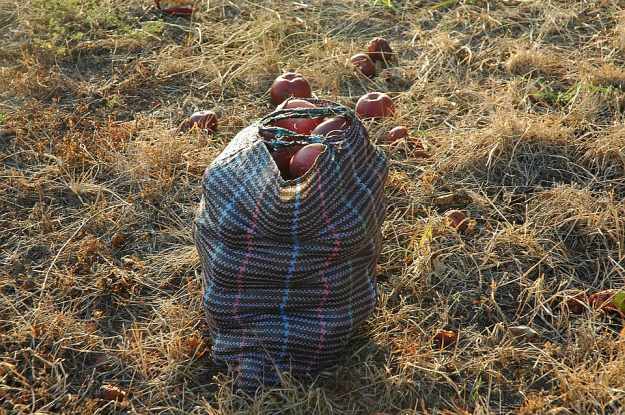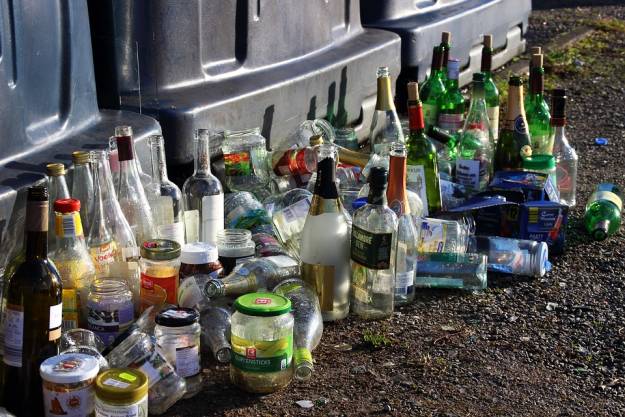Life in the suburbs makes dealing with trash relatively easy. You simply bag it, drop it in the curbside bin, and have it hauled away weekly. However, homesteaders living in rural areas have to be more mindful of their waste, as they often don’t have the benefit of a trash service. If you’re new to homesteading or are just looking for ways to manage your household garbage, this article is for you.
Trash: How to Reduce It In Your Homestead
Reducing household waste is one of the easiest ways to cut back on both spending and pollution. When shopping, look at the products you buy and reflect on ways to get around the need for packaging. For instance, is it something you can make yourself (cookies, bread, etc.)? Is there an alternative product with better packaging (paper vs. plastic)? Can you buy it in bulk and store it in reusable containers?
Use reusable bags when shopping. I’m not just talking about the canvas totes either — you can also get reusable produce bags! Keep extra bags in your car, just in case you forget to grab them when leaving the house. If you find yourself at the store without your bags, choose paper over plastic. You can still reuse it, and, eventually, recycle it.

Gardening is another fantastic way to reduce waste. There’s no need for packaging, no carbon footprint from transportation, and no unnecessary food processing (I’m looking at you, baby carrots!). If gardening isn’t your thing, buy fresh local produce from a farm or from the farmer’s market. Again, you’ll be able to skip the need for plastic packaging, and it will be fresh and in the season. Once you’ve had your fill of the fresh goodies, can the rest. Not only will you have the produce picked at peak ripeness, you’ll also cut down on the metal and plastic waste from canned and frozen produce.
If it’s practical for your family, consider going zero waste. From using cloth and glass to keep food, to making your own hygiene products, Joybilee Farm has a ton of fantastic tips on how to accomplish this awesome feat.
Responsible Waste Disposal
When it comes the time to get rid of something, there are a lot of options for doing so in an environmentally-conscious way. Start by reusing anything you can. Glass, metal, cloth, and even cardboard packaging has a number of uses on the homestead. For items that cannot be reused, or have simply met the end of their lifecycle, consider the following:
In the Home
The first place garbage usually ends up is in the kitchen trash can. When choosing a bin, look for something that will keep odors from getting out and insects from getting in. If you have dogs or cats who like to tip over the trash can, you’ll want to look for a model that is sufficiently pet proof. If you’re worried about the can smelling up your kitchen, sprinkle a little baking soda or kitty litter in the bottom of the trash bag to absorb unwanted odors. The number one thing to remember with in-home trash cans is to never discard cigarettes or hot ashes until they’ve been extinguished, as they're one of the top causes of house fires.
If you compost, purchase (or DIY) a kitchen compost bin for cooking scraps and leftovers. When it fills up, you can carry it out to the compost pile!
Compost
That leads us nicely to my next point; if you’re not composting yet, you really should give it a try. It’s one of the best (and easiest) ways to reduce, reuse, and recycle. Plus, it turns kitchen scraps into fertilizer gold! Any organic items that can’t be fed to your pigs, chickens, etc. should go into the compost pile. Plus, there are a ton of other household items that can go into the pile that you may have never considered, such as nail clippings, vacuum cleaner contents, toothpick, dryer lint, and even latex condoms! For more on what you can and cannot compost, check out this great guide.
Recyclables

Before chucking things into the trash can, separate out any recyclables. The majority of plastic containers are #1 and #2, which are highly recyclable, while plastic grocery bags can be dropped off at most grocery stores for recycling. Bag up your recyclables and stash them somewhere on the homestead until you can make a trip to your nearest recycling center – just make sure you wash them well to avoid odors that might attract scavengers.
Burn Barrel
Many state and local governments prohibit or restrict some or all backyard burning of waste. Be sure to know the regulations in your area before burning trash. A burn barrel is great for bones, meat scraps, paper not suitable for recycling, and yard trimmings — but please, PLEASE do not burn plastic. It’s bad for both you and the environment.
For safety’s sake, don’t burn on windy days, or after a long stretch of hot, dry weather. Be mindful of your neighbors; don’t burn if they’re outside enjoying nature, or if they have laundry hanging to dry. Once your barrel is half-full of ash, empty it into a large, heavy-duty trash bag and take it to your local landfill.
The Landfill
It’s important to know the location and rates of your local landfill, as you’ll be visiting it often. Anything that cannot be reused, recycled, composted, or burned will eventually need to make its way here, but the amount of those items will be entirely dependent on you. Like recyclables, bagged garbage will need to be stored on the homestead until you have time to take it to the landfill. Take the necessary precautions to make sure it isn’t scattered across your property by scavengers.
There are some household items that not only can't be recycled or reused, they can’t go to the landfill either. These items have to be disposed of at a hazardous waste facility. To the best of your ability, reduce your consumption of the following items, and when you do use them, dispose of them according to your city's laws:
- Batteries
- Electronics
- Light bulbs
- Paint
- Solvents
- Used motor oil
- Pesticides
Another often overlooked item that should not be tossed away haphazardly is unused or expired medication. Make sure to dispose of medication responsibly — it cannot go in the trash can or down the toilet.
Let's talk more about the trash on the homestead in this video:
Trash plays a huge part in the story of our lives, but we rarely give it more than a passing thought. However, by reducing the amount of waste we create, and reusing and recycling what we do, we can make a huge impact on both the environment and our wallets — and that’s good no matter which way you bag it.
How do you manage your trash in your homestead? Please leave your tips and experiences in the comment section below!
Get to know these 10 simple tips every urban homesteader needs to see and be on the right track!


Leave a Reply